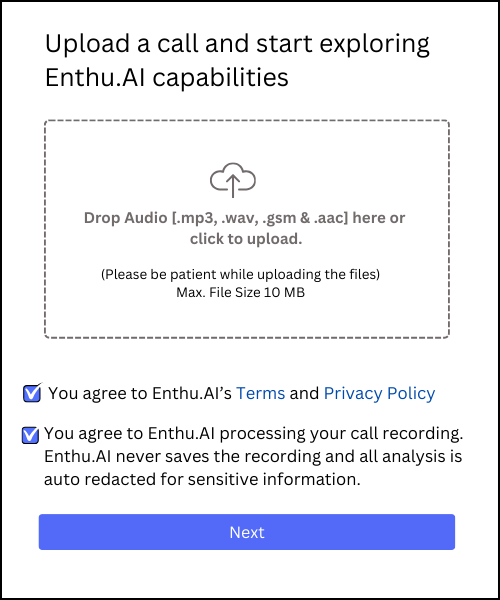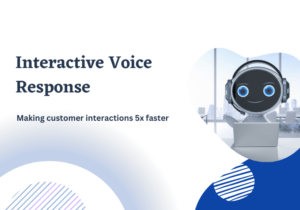Speech analytics is a concept that helps business leaders know their audience better and deliver a great customer experience.
Until now, most of sales leaders measured their sales efforts based: the number of calls made by the reps, the answer rate, the stage of the deal, revenue projection, deals won or lost; and so on.
No doubt this is critical sales input data but it misses an important piece of the puzzle.
What else can be done to improve the sales outcome and build a rockstar sales team?
This question can be answered if sales leaders know what happens after the call gets connected; something that has been missing from the sales purview till now.
Enters conversation intelligence – a sales toolkit for KPI-driven sales leaders that revolutionizes the way sales leaders can oversee and improve the performance of their sales team, enabling them to hit higher sales revenue faster.
In this guide, you’ll find:
- What is speech analytics?
- Use cases of speech analytics?
- Benefits of speech analytics?
- How do call center use speech analytics?
A. What is speech analytics?

Speech analytics refers to the business insights derived from the day-to-day conversations that your people make with your customers & prospects.
There can be multiple mediums over which such customer conversations happen – call, video, email, chat, etc.
Conversation intelligence helps you analyze this data and get meaningful information out of it. This is something which gets ignored by most of the companies
For example, the majority of the sales leaders ask their reps to write meeting notes after the call.
Since this is a manual process, there’s a lot of information that gets missed. Moreover, if you have a QA or a sales coaching team, they would just sample calls and give feedback on top of that sample.
Deploying conversation intelligence assures every call gets “heard” by the machine, intelligence drawn out from it, and insights provided to the decision makers for improving sales performance.
Thus, speech analytics uses computer-driven models to literally listen to the conversations, derive analysis, and offer actionable insights to build rockstar sales teams.
B. Use cases of speech analytics
1. For sales leaders
Conversation intelligence for sales leaders enables them to get a single view of all the customer interactions made by the sales rep.
Sales leaders can identify the winning conversations, new customer trends, and successful sales reps.
The most important benefit for sales leaders includes identification and setting the sales process benchmarks and, at the same time vetting the reps against the best practices.
In short, conversation intelligence helps sales leaders take data-backed decisions to improve the performance of their sales team and help them hit their quotas.
2. For sales coaches
The role of a sales coach is probably the most hectic and challenging one in the entire sales team.
Their job entails shadowing calls and listening to them minutely to deliver coaching recommendations.
This is how sales coaching has been done for decades. Unfortunately, this process is both inefficient and nonscalable.
Conversation intelligence can pinpoint those conversations that need your attention.
As a sales coach, that helps you focus your attention and effort towards fixing the weak behaviors and replicating the winning ones.
3. For sales managers
As a sales manager, your role is to enable your sales rep to reach their peak performance.
Conversation intelligence enables you to identify your mediocre reps and the gaps in their sales conversations, without the need to listen to even a single call.
You can handhold the mediocre agents and, at the same time make them replicate the conversations and scripts of your top-selling agents.
That way, you can enable your sales team to win and close more deals.
4. For sales reps
There are multiple benefits of conversation intelligence for the sales reps. First, they can focus on selling rather than taking notes.
Each call is transcribed, tagged, and available in your CRM for listening.
Next, conversation intelligence facilitates a learning environment where each rep can see themself against the benchmark.
They can listen to calls of the best agent, identify their own gaps, and work towards improvement.
Since there is intelligence available for each call, reps don’t need to filter through multiple calls.
They can pick the winning calls/agents, deep dive, and emulate them for better outcomes.
C. Benefits of speech analytics
1. Complete coverage
Existing methods to evaluate rep conversations are based on random sampling and can never offer 100% coverage.
The best sales teams listen to no more than 20% of the rep conversations.
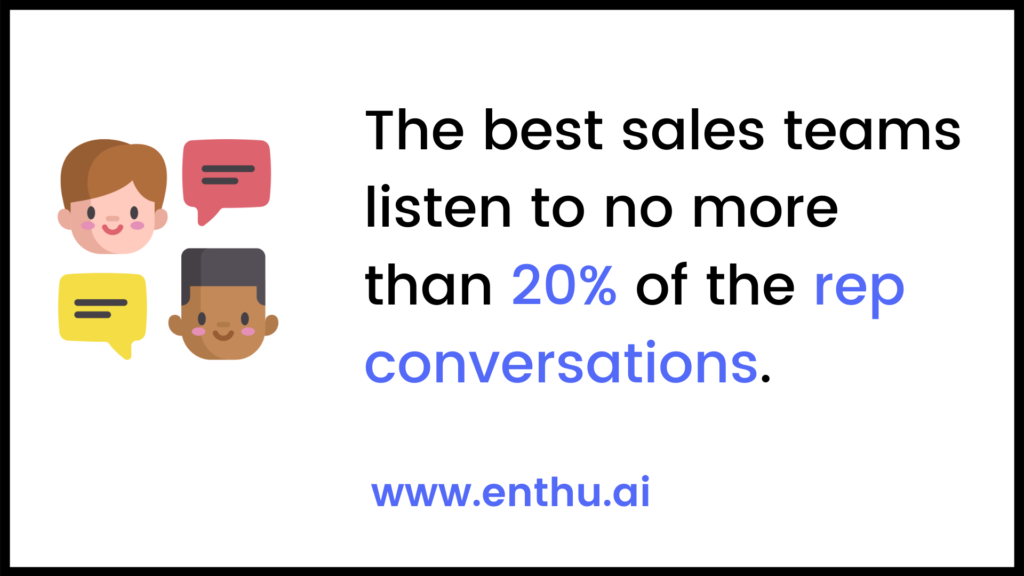
With Conversation intelligence software in place, sales coaches & QA teams can monitor all the customer conversations, without even listening to even a single call.
That way, they can focus their attention and time on coaching the agents and training outcomes, not on just listening to some random calls.
2. Benchmarking & evaluation
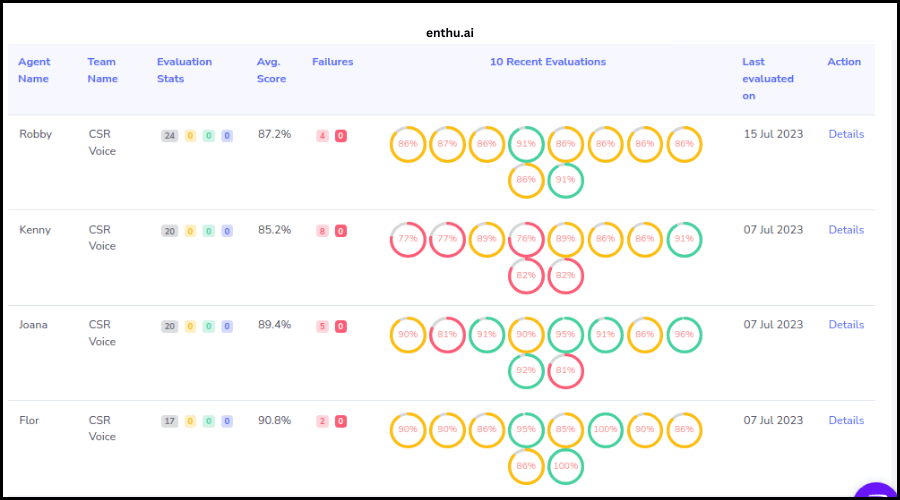
You can use speech analytics to identify benchmarks related to call quality.
You can see the agents that are meeting the call quality benchmark and those who are not.
Benchmarking always has a direct impact on the sales outcome, and you can use it to evaluate the reps as well. Generally, your best reps are the ones who are consistently exceeding the benchmark.
3. Behavioral analytics
What separates the winning agent from the mediocre ones?
Perhaps they handle client objections in a better way? Or maybe, they ask intelligent questions that makes the sale easier?
Whatever it is, this generally remains a guesswork for the sales leader.
Conversation intelligence can help surface and identify such winning and losing behaviors, enabling you to fix the losing one and replicating the winning one across the sales team.
4. Effective sales coaching
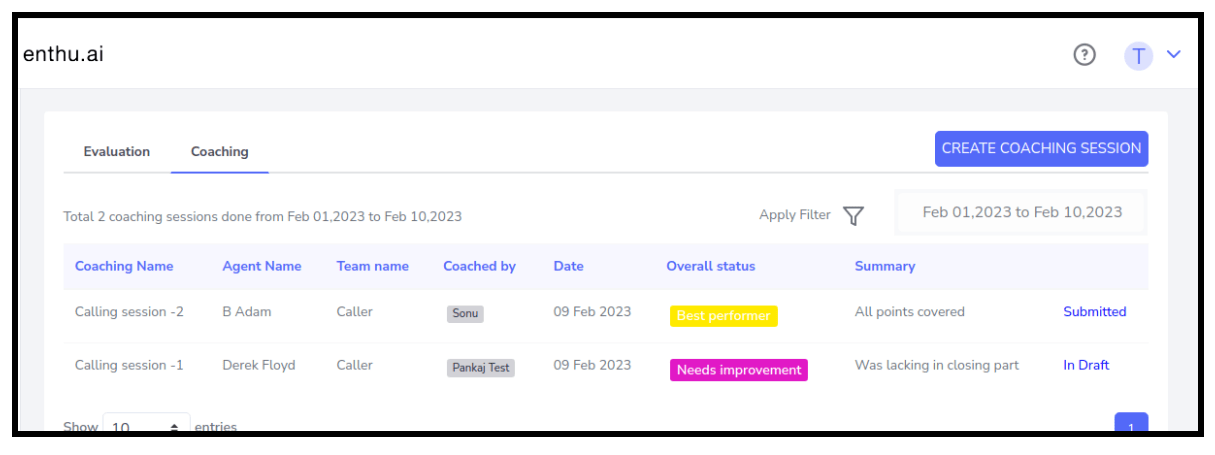
Conversation intelligence brings effectiveness within the sales coaching process.
Rather than wasting time listening to random calls, sales coaches now hear conversations where a problem has been detected by the tool.
They can directly jump to those parts of the conversation that are marked by the software, thus saving a lot of time.
5. Faster agent onboarding
With conversation intelligence by your side, your agents can onboard and get productive 3 times faster.
You can show them the winning behaviors and how it result in better sales outcomes.
You don’t need to listen to every single call these reps are making. The conversation intelligence tools does the work for you.
And faster and to-the-point feedback means faster curse correction and better performance.
6. Cost savings
Deploying a conversation intelligence platform results in cost savings across multiple arenas.
It reduces the call QA time and results in faster feedback cycles. It also helps in faster agent ramp up.
Not just that, it results in catching sales mistakes well within time.
Some of these mistakes can actually cost you money, especially if it lies within the regulatory or legal ambit.
7. Faster quality assurance
As per a research, more than 66% contact centers fail to measure even 6 calls per agent per month.
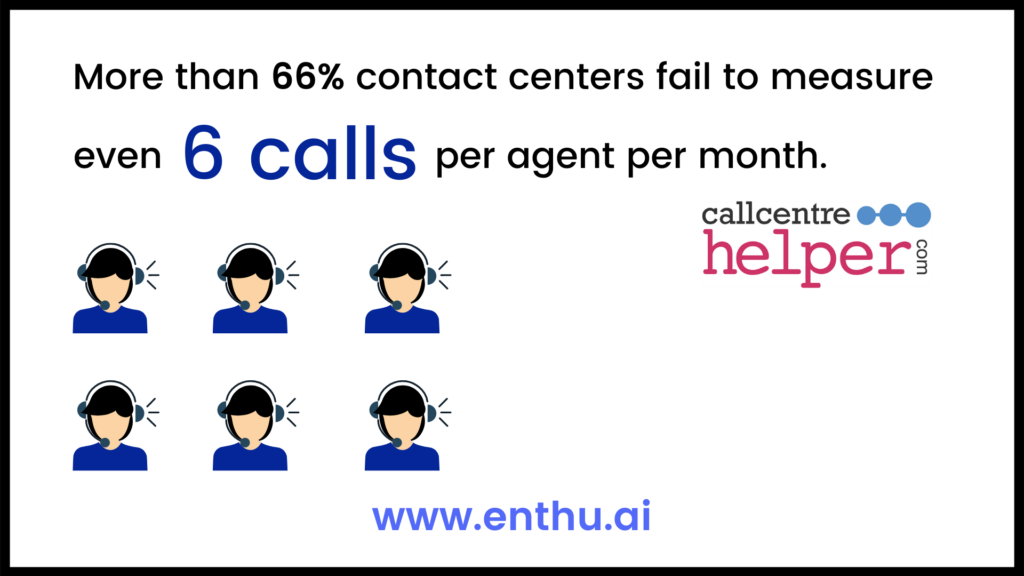
Quality monitoring at contact centers is still a manual operation that demands time and investment. Most of the setups don’t have formal sales coaches, and those who do, have their plates full.
In such scenarios, it’s either peer to peer quality assurance or random sampling of the calls.
The former is not a great way to improve performance (due to lack of standardization) while the latter leaves so much behind on the table.
Conversation analytics helps you achieve faster QA by surfacing those calls that need urgent attention, without listening to even a single call.
While the role of a human still exists, the time is now spent listening to the calls where an issue actually exists (rather than listening to random calls).
8. Reduce compliance & risk issues
Do you risk penalties because an agent missed a mandatory disclosure specified by a regulatory agency?
As an example, a failure to disclose material information can attract civil penalties upto $16,000 per instance, as per the Telemarketing Sales Rules (TSR) released by the FTC, USA.
These fines skyrocket as you move from general guidelines to industry specific guidelines (e.g. healthcare, insurance, banking etc.).
The question that remains unanswered is: Do your sales agents provide the right information, or are they providing too much or too less an information that can cost the company its business?
This remains a mystery till your quality person lands on such a call. And that’s the problem with random QA.
But not if you have a conversation analytics platform set for your sales team. Catch all such costly mistakes right when they occur.
Conversation analytics tool transcribes all the sales calls automatically and runs deep analysis to find regulatory and compliance issues.
All your reps get marked against defined scripts, thus ensuring 100% adherence to what’s necessary.
D. How do call centers use speech analytics?
Call centers use speech-to-text analytics to analyze and extract valuable insights from recorded customer interactions.
This technology employs various techniques such as natural language processing (NLP) and machine learning to transcribe, process, and understand spoken language.

Here’s how call centers use speech analytics:
1. Call monitoring and quality assurance
Speech analytics helps call centers monitor and evaluate the quality of customer interactions.
It can automatically transcribe calls, identify keywords, and analyze tone and sentiments. This enables supervisors to identify areas where agents excel and where they need improvement.
By evaluating calls, call center managers can provide targeted training and coaching to improve customer service.
2. Sentiment analysis
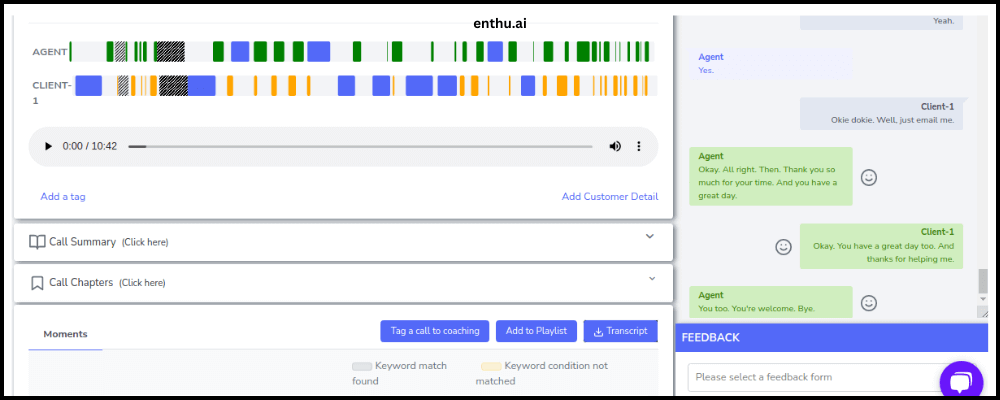
Speech analytics solution can gauge the emotional tone of both customers and agents during calls.
It can determine whether a customer is satisfied, frustrated, angry, or neutral based on vocal cues and the words used.
This information can help call centers identify trends in customer sentiment and take appropriate actions to enhance customer experience.
3. Trend identification
By analyzing a large volume of customer interactions, speech analytics can identify emerging trends, common customer complaints, and frequently asked questions.
This information can help call centers make informed decisions about product improvements, service adjustments, or marketing strategies.
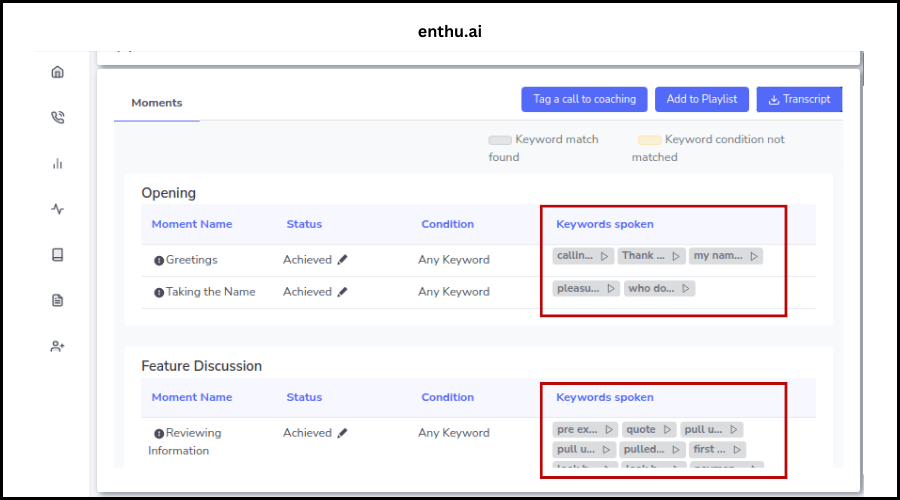
4. Script effectiveness
Call centers often provide agents with scripts to follow during interactions.
Speech analytics can assess the effectiveness of these scripts by analyzing customer reactions and outcomes of interactions.
5. Customer insights
Speech analytics can provide insights into customer preferences, needs, and behaviors.
This information can guide call center agents to offer more personalized solutions and recommendations during interactions.
Overall, speech analytics empowers call centers to optimize their operations, improve customer experience, and make data-driven decisions.
Conversation intelligence tools surface the call issues within no time so that you can focus your QA attention where it matters the most.
This results in faster feedback, better coaching and improved learning.
Let’s understand some benefits of conversation analytics for sales teams.
E. What all can conversation intelligence monitor?
1. Sales pitch
Most of the sales teams have a script to play during the call.
While the flexibility to deviate from the script depends on the complexity of the sales process, adherence and improving the script is always considered as a winning behavior.
Conversation intelligence can track how far the agents following the script, and you can relate that to sales output.
2. Moment identification
Every sales call has a number of predefined moments.
For example, the first part of the call ideally starts with a salutation, followed by an intro and needs identification & discovery.
This is generally followed up by questions and answers, may be feature discussion, perhaps pricing discussion, and finally an end of the call with the next steps.
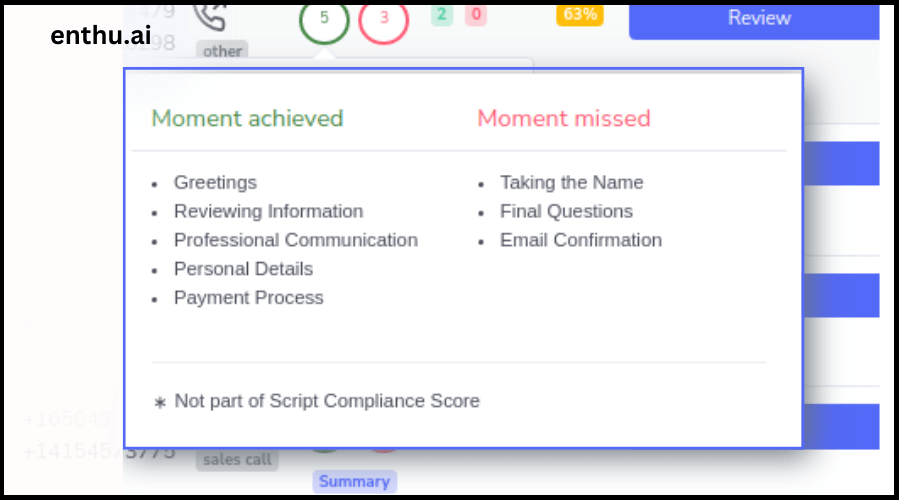
Do you know which all moments your sales agent missed (e.g. a message required to be given out by law)?
Or did he hit a moment which he shouldn’t have (e.g. disclosing an information that is prohibited by the law)?
Conversation intelligence can mark all the standard moments, plus the sales leaders can define their own moments, custom to their sales process.
3. Keyword analysis
Want to filter calls that are talking about a particular keyword or phrase. This can be easily done using conversation intelligence.
4. Key call metrics
Do you track critical call metrics like silence ratio, patience score, script compliance, call quality, overall sentiment etc.
If your existing call software doesn’t help you with this information, conversation intelligence definitely can.
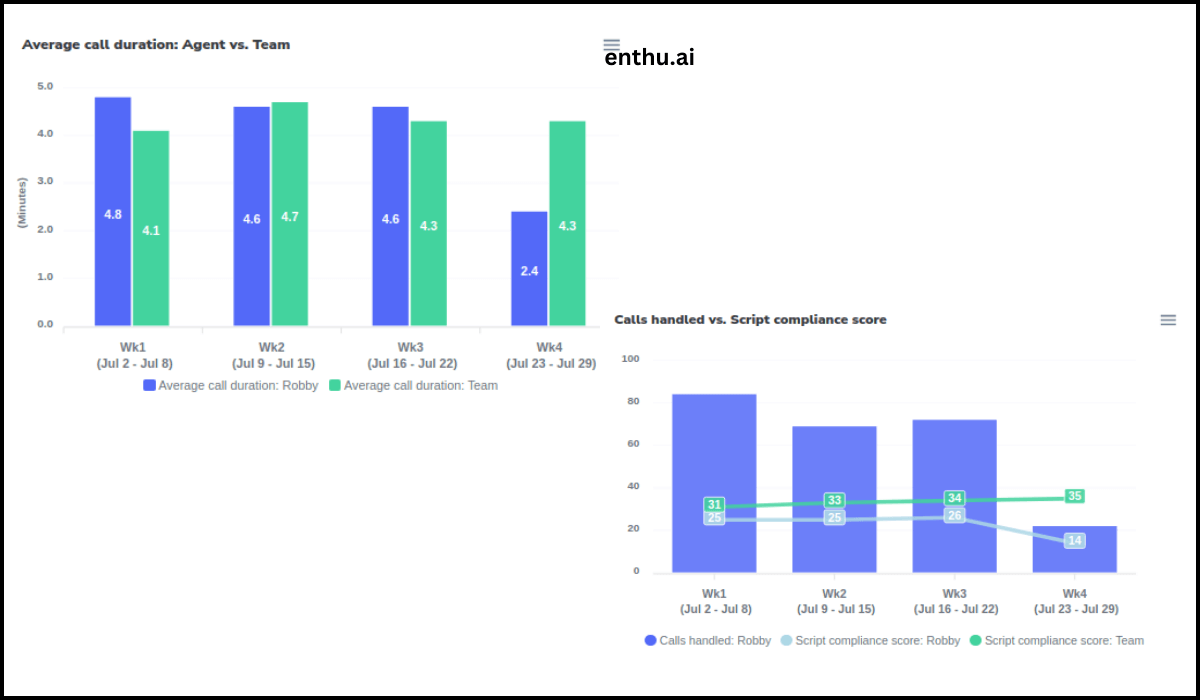
Conclusion
Speech analytics revolutionizes the way sales teams approach revenue performance.
There are multiple benefits of implementing such a solution, from better sales performance to better quality checks to reduced costs and improved target hits.
As a sales leader, if call quality adherence is your continuous challenge, it’s time for you to explore Enthu for your sales team.
It’s where conversation intelligence software like Enthu can help you monitor conversations, without the need to listen to every single call.
That’s definitely a smart way of improving sales performance.
FAQ’s
Q.1. What are the benefits of speech analytics?
The benefits of speech analytics are: Faster quality assurance,100% coverage, Reduced compliance & risk issues, Benchmark agents, Understanding winning behaviors,Drive cost savings,Coach reps
Q.2. What are the speech analytics use cases in contact centers?
Ans. In contact centers, speech analytics improves customer service by analyzing calls for sentiment, issue identification, and agent performance. It enhances training, ensures compliance, and refines processes, resulting in better customer experiences and operational efficiency.
Q.3. What is speech analytics in a call center?
Ans Speech analytics in call centers involves using automated tools to analyze recorded customer interactions, extracting insights to enhance customer service, agent performance, compliance, and operational efficiency.

